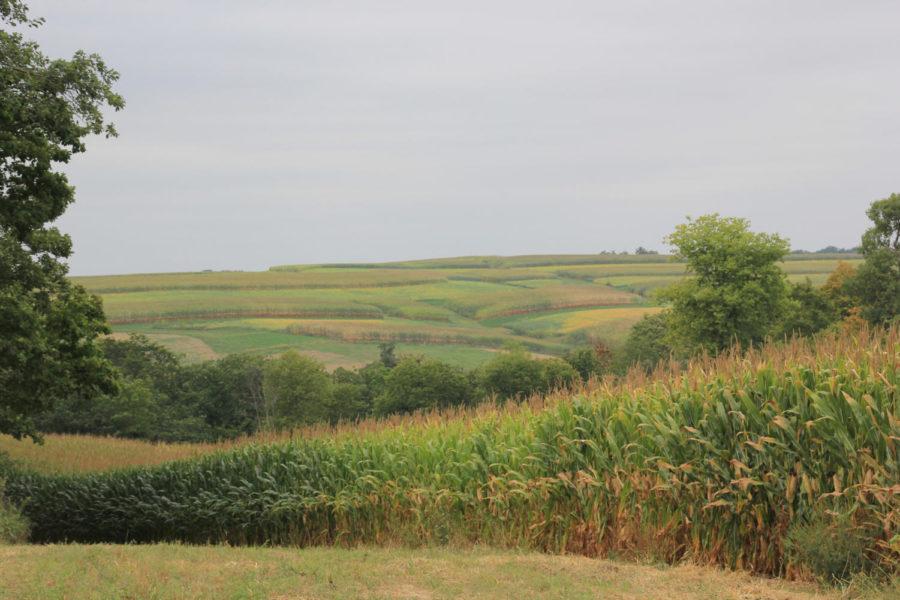ISU economists caution farmers of possible drop in prices, increase in interest rates
Jonathan Krueger/Iowa State Daily
A potential downturn in land and commodity values could have a significant impact on the College of Agriculture and Life Sciences. This downturn could affect enrollment and post-graduation job placement as well as the number of students able to afford Iowa State University tuition.
September 10, 2013
ISU economists are warning farmers to be aware of a possible downturn in the prices of land and commodities, as well as an increase in interest rates.
During the past five to six years, costs and values of commodities and land have been rising. Commodity and land values have followed a very high-to-very low pattern in the last 100 years. There have been three strong indications of this pattern.
The first indication began in the late 1910s, leading to the Great Depression. The second was in the 1970-80s, better known as the farm crisis. The third indication is now, beginning in 2012.
“Historically, agriculture has been a cyclical industry,” said John Lawrence, associate dean for the College of Agriculture and Life Sciences. “The idea of what goes up comes down. We’re just encouraging farmers to keep that in mind.”
However, the expected downturn is not anticipated to be immediate, unlike the farm crisis. Lawrence said the more powerful financial blow could occur in two to four years.
Iowa’s weather conditions are partly to blame for lower crop yields and, therefore, less farm income.
“Lower yields were sold at this year’s lower price, which cuts into income,” Lawrence said. “This year, because of a record wet spring and dry conditions, it’s looking to be another short crop year. In some areas of the state, [farmers] didn’t get fields planted, so they’re falling back on crop insurance.”
This will be the fourth year in a row of national average corn harvests being below the expected yields.
What economists call the wealth effect is to blame, too. The wealth effect occurs during a high-income time for farmers, where they “felt like they were getting a raise all along, when really, it was just a bonus that wasn’t going to last forever,” said Michael Duffy, professor of economics and agriculture.
The wealth effect is a phenomenon through which farmers’ livelihoods could be heavily impacted.
“People get accustomed to a certain lifestyle,” Lawrence said. “Even though their income declines, their spending does not, either because their down payments bought land or they’re just accustomed to those sorts of things.”
Economists are also encouraging farmers to be wise with their spending and borrowing from the banks. Farmers should assess machinery purchases, plan ahead and get a good sense of where this year’s crop is.
They should also be wary of taking on more debt.
Interest rates are currently on the rise. Last spring, rates were about 1.4 percent. They have more than doubled in the last six months.
“The Federal Reserve has maintained artificially low interest rates in order to stimulate the economy,” said Dermot Hayes, professor of economics and agriculture. “We, as investors and consumers, will invest and spend more when interest rates are lower. The Federal Reserve has done this on purpose. … They do it by buying government debt and maintaining and spending its own money. [The Federal Reserve] has announced it’s going to slow down that activity, which means the interest rates on government debt will go up; in turn, that means the interest rates on most other debt in the U.S. economy will go up, too.”
Though there is still a boom in agriculture, a possible downturn could have real effects at Iowa State.
Hayes said Iowa’s farm income will be lower than expected, affecting students’ ability to afford the costs associated with attending Iowa State. Thus, fewer students who are more likely to go into agricultural majors will enroll in the College of Agriculture. Fewer students may be able to return to the family farm, too, because of high costs.
The downturn could also affect the 98 percent job placement rate for the college’s graduates.
“If farmers pull back on their purchases companies may pull back on their workforce, as well,” Lawrence said. “Ag employment follows farm economy. If the farm economy weakens, the job market will too.”
By frequent assessment of working capital and making smart decisions about debt, farmers can better prepare for the potential downturn.
“Iowa is an agricultural state,” Duffy said. “We always need to be mindful of what’s happening in agriculture. Things are never as good or as bad as they seem.”

















